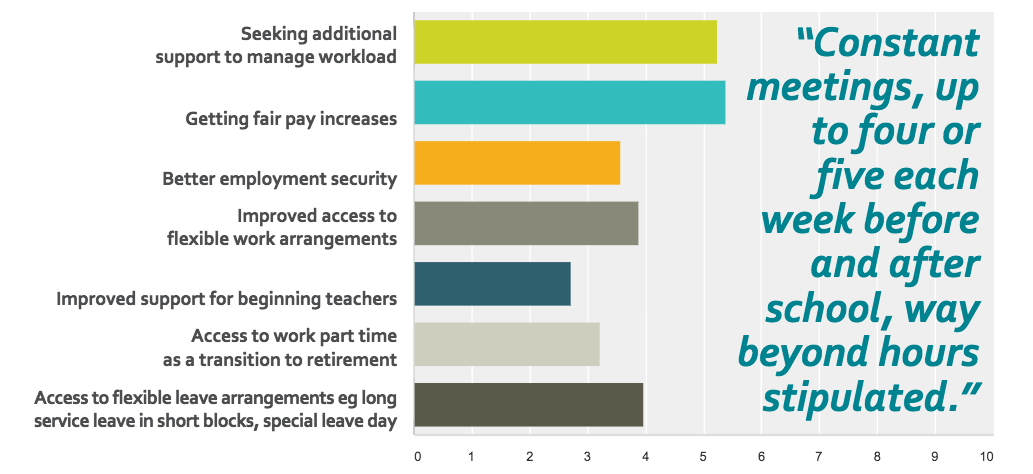Three thousand members speak in unity about workloads The IEU recently sent a survey to Catholic systemic school members. The instrument was designed to gather both data and qualitative responses (1871 written responses were garnered).
Members speak on workloads

The take up rate was beyond the Union’s expectations. The core message received was:
- get fair pay increases, and
- members require support to manage their workload.
Meetings, meetings and more meetings
Specifically, members targeted meetings (beyond the standard scheduled typical pattern of a 20 minute briefing and a one hour staff meeting) as being a major concern and a distraction from the core business of teaching and learning.
One respondent said: “Constant meetings, up to four or five each week before and after school, way beyond hours stipulated.”
Electronic communication
Protecting teaching and learning from digital intrusion was a further theme. The urge was for the development of protocols to place boundaries on electronic communication and modify expectations of what is a reasonable response time.
Hotspots
In a pedagogical sense, programing and curriculum change are hotspots. The desire was to meet BOSTES requirements, be respectful of an employer overlay but to refine what is being sought by the various dioceses. Programing is unnecessarily complex, especially in terms of repetition and replication. Suggestions ranged from exemplars (to be modified and contextualised) to requests that BOSTES meet with the Catholic Education Commission to ensure that accountability be met but not exceeded to the degree that a school’s energy is sapped by over responding. Clarity of expectations was the message.
Data collection concerns
Within the classroom data collection and analysis was a key concern. Placing to one side data which is a must do (generally linked to funding), the appetite for data appears insatiable. The IEU intends to call for an audit to determine the efficacy of what is dictated and to reaffirm the primacy of teacher professional judgement.
One respondent said: “The national collection of data requirements is taking me away from teaching my students and making me a very expensive data entry person.”
Another said: “Too much data collection and not enough time to actually know kids as people not numbers.”
Curriculum changes
Curriculum change (in all its manifestations) as an ongoing source of complexity was highlighted by members. The solution is teacher release to augment the change process, not simply a reliance on another series of meetings to achieve change.
Managing student behaviour emerged as a concern and was followed closely by class sizes and how best to control them in terms of setting caps.
Unpaid overtime
Support staff noted they completed significant unpaid overtime and even when directed to work, less than 10% were paid overtime. Many support staff felt they were incorrectly classified.
Time poor
Time was the resource executive members craved. In tandem with ‘time’ was improved access to flexible work arrangements. Administrative support for principals featured and enhanced support for compliance issues.
The IEU found it particularly gratifying that some 534 reps answered the survey. This is testament to the critical role IEU chapter representatives play in the workplace.
What do members want?
- A process whereby teachers do not work unreasonable hours. Should excessive hours emerge, steps must be taken to identify the cause and reduce the impact.
- Protect RFF by including it in the EA.
- AITSL processes must stem from the ordinary work of the teacher and be supported.
- Email – parents should be advised that staff are not expected to answer emails outside ordinary working hours.
- An audit of data - the impact on teaching time must have a dividend.
- Programming in excess of BOSTES requirements impacts on teaching and learning.
- Support staff want overtime to be paid and to know that they are correctly classified.
- Both teachers and support staff believe an overnight camp allowance is reasonable to acknowledge the inconvenience.
Framing the debate is critical as the Union moves forward into formal discussions with the Catholic Commission for Employment Relations.
It’s about:
- trusting teacher professional judgement
- questioning data collection
- defining meetings, and
- not programming in excess of BOSTES requirements.

Facebook Comments
What teachers say...Clare: Anything that needs a response which I can't get to immediately, I click reply, save it in drafts and get to it when I can.
Mellisa: Only answer emails in work hours. If you start answering emails out of hours people will expect responses 24/7.
Elsie: I disagree Mellisa, as a student teacher completing my final rounds the only real time I am having is out of hours. A few emails between my teacher and I haven't hurt at all. Last night I emailed a few generous paid resources to some teachers and got a kind reply at 10pm. If emails are going to make life easier and get one job done on the to do list then I will definitely be keen on using them in and out of school.
Lubna: I took my work email off my phone. I was being expected to reply to everything.
I only reply to my Year 12s and told my Year 11s, I'll reply up until 9pm during exam times. Burnout is indescribable.
Stephen: So much crap is sent through. Can somebody please explain to others that an email isn't effective communication. And some people write essays in an email. It’s ridiculous. My answer, just delete the obvious offenders.


































































































































